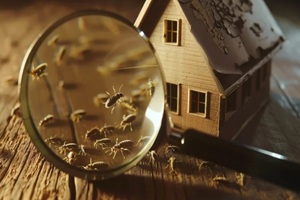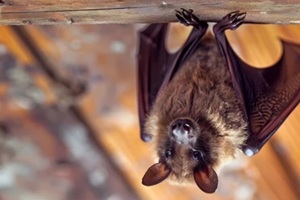 Springtime can feel like a breath of fresh air, both figuratively and literally, with warmer temperatures and the return of longer daylight hours. However, alongside all of the beautiful blooms and pleasant weather come other, less appealing visitors: bugs. Spring is an ideal time for the bug population in your home or business to explode. They spread out, looking for food to support their reproductive cycle.
Springtime can feel like a breath of fresh air, both figuratively and literally, with warmer temperatures and the return of longer daylight hours. However, alongside all of the beautiful blooms and pleasant weather come other, less appealing visitors: bugs. Spring is an ideal time for the bug population in your home or business to explode. They spread out, looking for food to support their reproductive cycle.
As their natural predators also come out of a long winter’s rest, bugs are especially vulnerable outdoors. A human home is a safe haven and smorgasbord that gets bugs a strong start in the spring, so it’s common to see an increase in pests. With integrated pest management and some thoughtful strategy, it’s possible to cut down on their numbers without harming the environment.
The Most Common Springtime Bugs (and Why You Should Care)
With spring come waves of insect invaders. Some of the most common you can expect to see in and around your home include:
- Ants
- Mosquitoes
- Beetles
- Stinkbugs
- Ticks
- Spiders
- Wasps
- Earwigs
While some of these insects can be a minor annoyance, others are much more problematic. Homeowners should always treat a pest infestation seriously because many bugs can be vectors for disease. Most people know that ticks and mosquitoes can carry illnesses such as West Nile or Lyme, but fewer know that flies and other everyday pests are problematic. From salmonella to shigella and staph, sicknesses are inextricably linked to the presence of insects.
What Is Integrated Pest Management?
With so many bugs seeking to claim your home as their own in the spring, what is the best strategy to reduce their numbers? Professionals recommend integrated pest management. This strategy focuses on doing as little environmental harm as possible, thus avoiding pesticides and other harmful compounds. Instead, IPM targets the bugs’ living environment, food sources, and life cycles to reduce their numbers and make the home a less appealing place for them to live.
This option has multiple benefits. While it removes unwanted pests from the home, it also drives them back into nature, where they serve as an important part of the food chain for the rest of the ecosystem.
IPM Strategies for Spring Bugs
If you are facing a bug problem, there are many integrated pest management options to control them. Some simple but impactful recommendations include:
 Biological control: This method involves introducing bugs’ natural predators to the environment or supporting predators already there. For instance, ladybugs and some bacteria are problematic for bugs (depending on the species) and will not harm the rest of the property. In the case of mosquitoes especially, supporting local birds, bats, and dragonflies is essential. This method may involve planting flowers that these species like or providing a bird feeder. Certain plants, such as marigolds, also deter some bugs due to their natural scent.
Biological control: This method involves introducing bugs’ natural predators to the environment or supporting predators already there. For instance, ladybugs and some bacteria are problematic for bugs (depending on the species) and will not harm the rest of the property. In the case of mosquitoes especially, supporting local birds, bats, and dragonflies is essential. This method may involve planting flowers that these species like or providing a bird feeder. Certain plants, such as marigolds, also deter some bugs due to their natural scent.- Environmental control: Bugs need certain living arrangements to thrive. By controlling their environment, homeowners can make their residences less appealing than the outdoors. Remove sources of food and shelter within the home, such as crumbs on the floor, open food packages, and piles of cardboard boxes.
- Mechanical control: In many cases, bugs enter the house through a vulnerability the homeowner has not noticed. Placing a physical barrier at these locations is often enough to stop the insects from getting inside. Caulking around exposed pipes, sealing the cracks around doors and windows, or patching a home’s siding are good places to start.
The best-integrated pest management strategies use a mixture of these tactics to overcome a bug infestation. The best way to approach IPM in the spring is to implement these concepts before bugs become an issue; after all, an ounce of prevention is better than a pound of cure. Home and business owners who are not sure how to apply IPM to their property’s specific layout and needs should contact a professional pest control team that has experience with IPM.
Get Pest Control Help for Common Bugs from the Pros
 Integrated pest management is an effective method of controlling bug populations for some of the most common insects in the home during springtime. However, the strategy for each home should be customized to that property’s specific vulnerabilities.
Integrated pest management is an effective method of controlling bug populations for some of the most common insects in the home during springtime. However, the strategy for each home should be customized to that property’s specific vulnerabilities.
The professionals at Spartan Animal & Pest Control can provide customized IPM suggestions to make your home a more pleasant place for humans (and not pests) to live this spring. Contact Spartan to schedule a visit and learn more about how you can keep bugs from taking over your home as the weather gets warmer.



